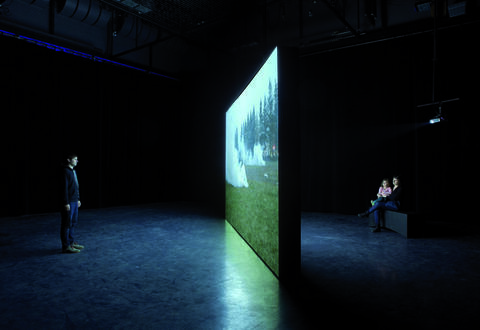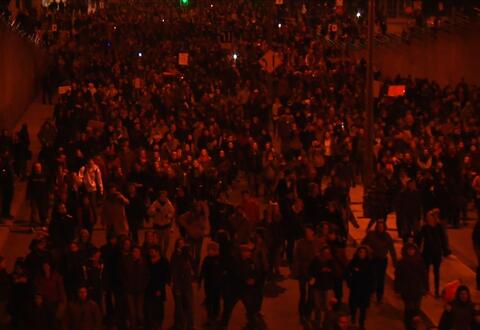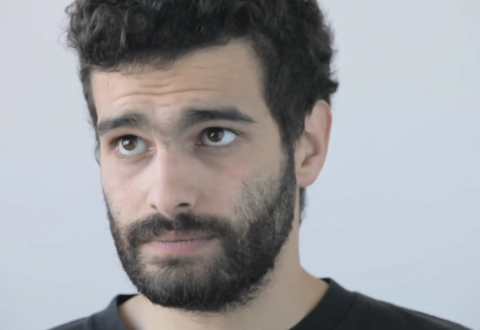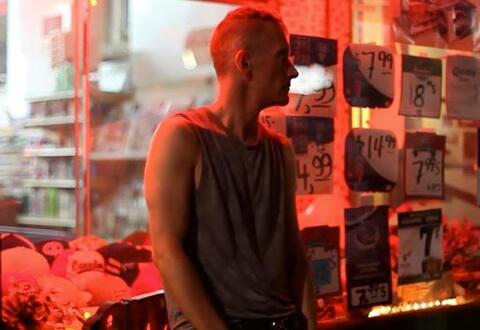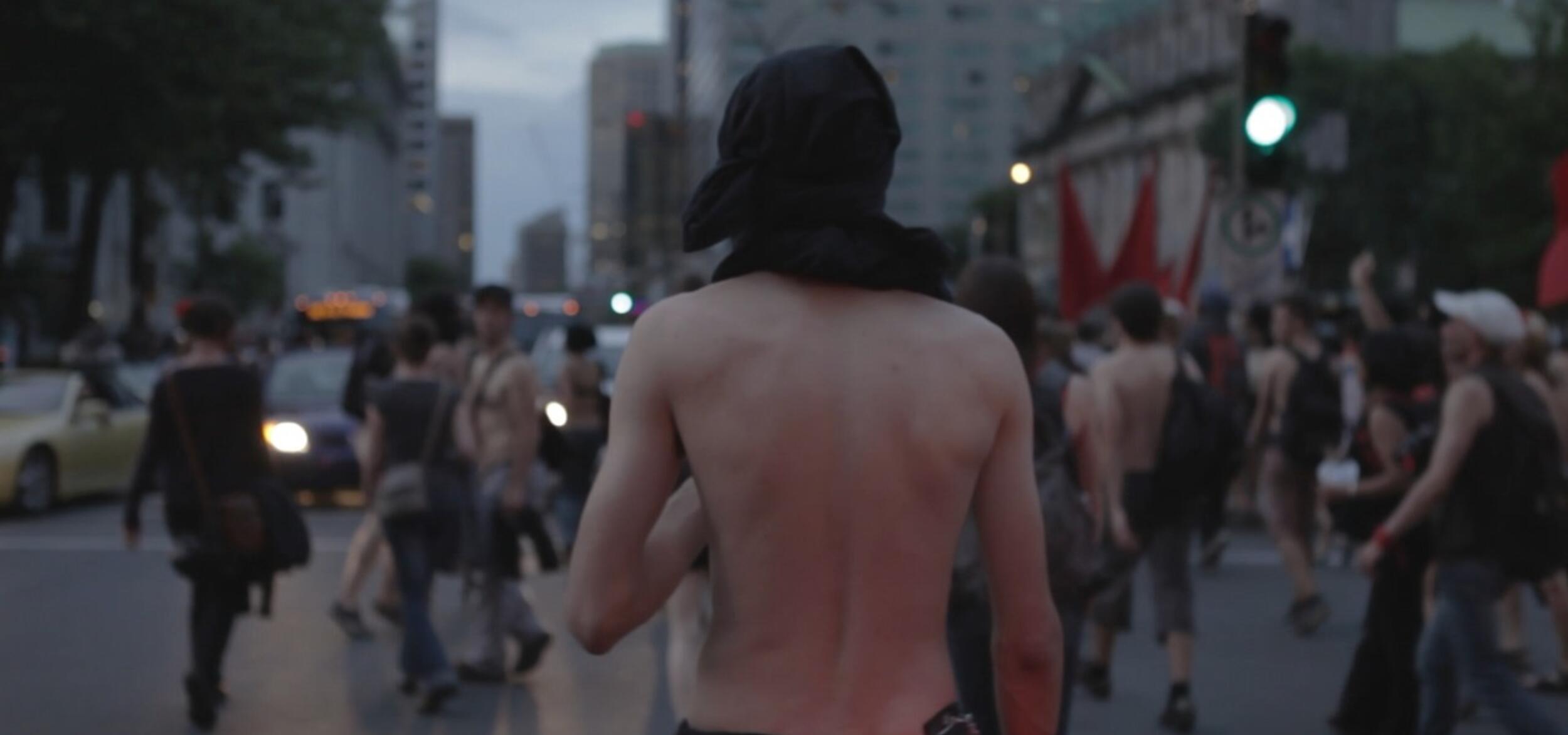
Épopée (2009-2017): Giving form to contemporary politics
An assessment of the work of Groupe Épopée.
To describe Épopée, Groupe d’action en cinéma, is to acknowledge a trajectory, in which art and politics intersect, that has brightened the sky of Quebec cinema with exceptional originality and consistency, from 2009 to 2017.
It all began during the making of Men for Sale (2009), a documentary dedicated to giving a voice to young sex workers and drug users in the Centre-Sud district of Montréal. This was shot at regular intervals over the course of a year, until the ‘guys’ expressed an interest in trying their hands at filmmaking themselves – not just getting behind the camera but making works of fiction. Writing workshops were then organized by the Men for Sale team in collaboration with the RÉZO organization, who have been involved since the beginning, and this led to an ensemble of short films—some works of fiction and a number of documentary shorts entitled ‘Trajets’—which are available to view on the épopée.me website.
From an early stage, the collective used a diverse range of mediums and dissemination methods in an attempt to escape the formatting constraints that had effectively hindered the production of Hommes à louer. As well as being criticised for its length, which was integral to the quality of the film, it was criticised for the absence of a unified perspective, the absence of a plot that would channel the viewer’s reception of the film and generate predetermined emotions intended primarily to elicit a distanced sympathy—a facile way of reinforcing our good social conscience.
The collective’s evolution demonstrates a play in the relationship – proximity and distance – between documentary and fiction. The strict generic distinction between them is weakened, an approach that aids in the Épopée group’s aim, in each of their films, to lend form – visible and audible – to the violence of the contemporary world and, more specifically, to modes of subjectification intrinsic to late liberalism, marked by an ever-increasing privatization of all aspects of life – of which the transformation of socio-political issues, concerning collective life, relating to mental health issues is emblematic. Épopée are mindful of the effects of control in perceptual practices such as cinema, a privileged vehicle, and endeavour to undermine them.
The images on épopée.me have also undergone different edits, which led to two feature length films, L’état du moment (2011) and L’état du monde (2012), as well as an installation, L’état des lieux (2011). The collaboration between the protagonists of Hommes à louer extended to L’amour au temps de la guerre civile (2014), a feature-length fiction film based on a script written by one of the participants of the workshops. It constituted a new point on the constellation formed by this ensemble of films—a chamber of echoes, more than a portrait, of these radically exposed lives.
The collaborative production of this corpus corresponds to the group’s first stage of explorations into the boundary between the aesthetic and political, which will never cease to mutate and transform over the years and through the productions, for diverse reasons; all of the issues raised by the collective work cannot be addressed in detail here. And if, in describing Épopée, I have not mentioned anyone by name, it is because anonymity slowly became a nodal point on the politization of their practice, running contrary to the constraints of stardom on creativity. Épopée represents a constellation in metamorphosis, made up of individuals who have participated in projects to varying degrees, for varying lengths of time, over the years.
The recomposition of the group occurred notably thanks to the student strike of 2012 and the social movement that it gave rise to; Épopée documented the actions and protests throughout, bearing witness to what would in fact become the major event in Quebec public life today. This demonstrates that the relevance of Épopée’s work, rooted in a precise and rigorous reading of the political issues of our times, allows the group to be receptive to the contingency of their unique positioning; this was already demonstrated in the images at the end of L'état du monde, which was shot at the ‘Occupy’ camp at Victoria Square in Montréal.
The group’s documentation of the 2012 movement resulted first in Insurgence (2012), a documentary shot in close proximity to what could basically be described as the front line between the police—the intransigence of power—and the activists. The film, which freely and chronologically followed the long months of mobilization, without teleology or voice over, attempts above all to convey the power of community that was generated and tested at that time, particularly during the night-time protests.
This continued with the making of a second film d’écoute (the first being Men for Sale). Rupture gave voice to those hurt by the strike, the injured and the prosecuted of 2012 and 2015. This film, together with Insurgence and Contrepoint, in which a number of musicians who participated in the strike play their instruments, comprised the installation Fraction (2016). Conceived to be shown in a gallery as L’état des lieux had been, this installation explores another mode of presentation and dissemination of cinematographic imagery. The combined presence of three films, along with the noise from the street, voices and music, gave form to the complexity of the movement, its moments of harmony and of discord.
Épopée’s corpus is characterized by consistency, maintained principally through the rigour with which the group has explored and occupied the zones of articulation and tension between the aesthetic and the political in film after film. It is also characterized by the desire to work as a team, and to find images that invite reflection on our contemporary condition and resist the complacency and aesthetic poverty of so many activist films. The political scope and focus persist, following a constant line through the collective’s trajectory, building immanent and fraternal relationships with those who fall within their scope, avoiding all overarching perspectives, be they critical, despondent or pacifying. The films’ inherent engagement in their subjects serves as testimony to the place of filmmaking in contemporary political thinking, which is essential to Épopée, who in turn nourish the numerous reflections and writings that contribute to this ecology – and to which this text is indebted.
Translated by Sarah Knight.
Further Reading:
24 images. « Les enfants sauvages », n° 136, p. 34-40. Mars-avril 2008.
---------------. N° 171 « L’amour au temps de la guerre civile ». Mars-avril 2015.
Érik Bordeleau. « Effusion et contre-effectuation », Esthétique politique, 2015.
Marion Froger. « Épopée urbaine à Montréal ». Multitudes n° 65, p. 190-198. Avril 2016.
André Habib. « Épopée – L’état du moment. Un état et des variations ». Hors-champ. 2012.
---------------. « Entretien avec Rodrigue Jean et Mathieu Bouchard-Malo. La poésie du vivant ». Hors-champ. 2009.
Anne Lardeux. « Liberté pour nous aussi ! ». Liberté n° 315. Printemps 2017.
Spirale. Hors-série n° 1. Épopée. Textes, entretiens, documents. 2013.
Adam Szymanski. 2016. “Immanent to Exclusion, A Review of Love in the Time of Civil War by Rodrigue Jean.” Scapegoat 9: Eros. 2016.
Picture: Épopée, Insurgence, 2013






